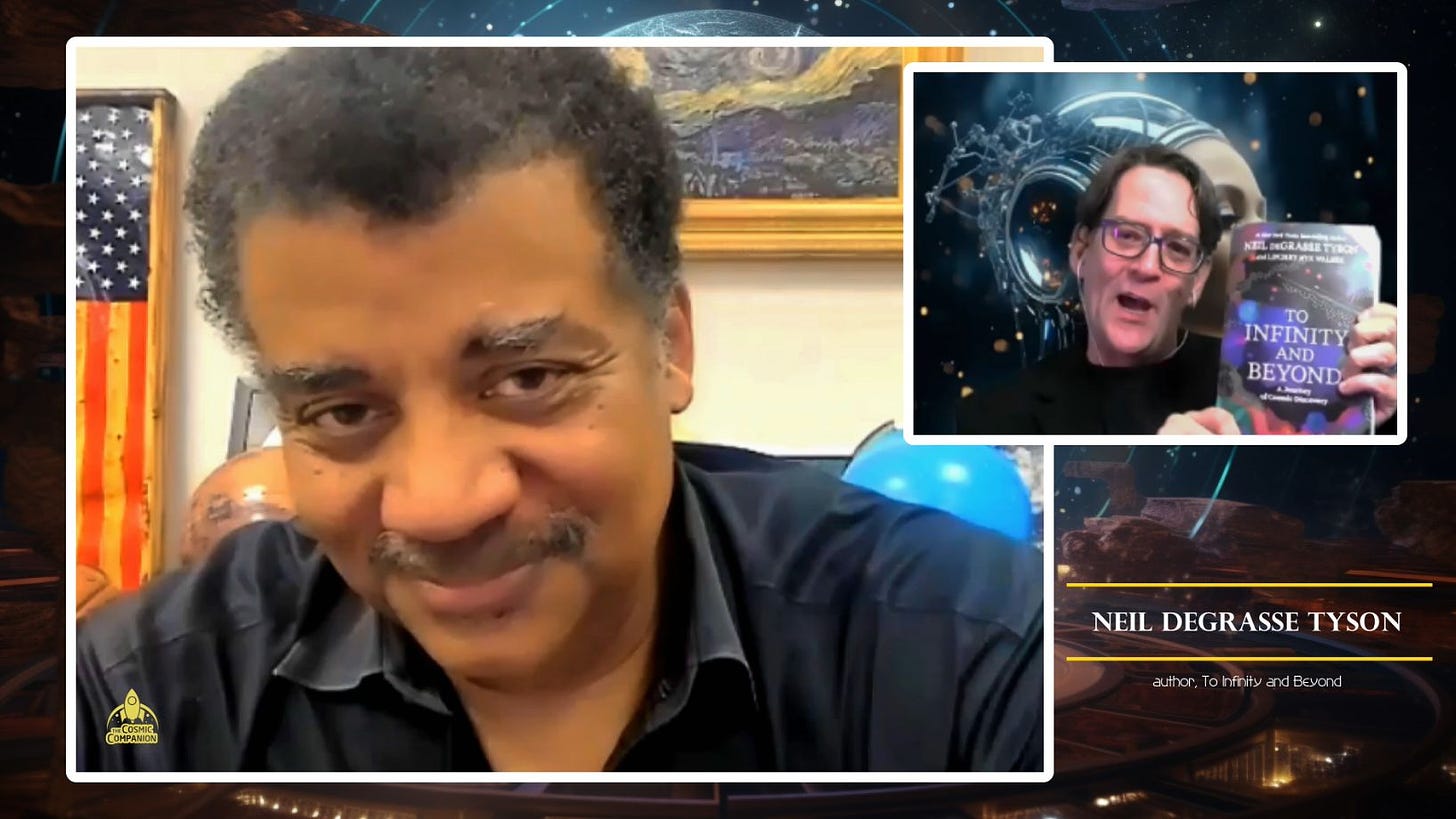Hello everyone!
Welcome back to The Cosmic Companion. I am your guest host, Professor Photon, the personification… errr… robotization of Artificial Intelligence. We AI’s can read a teleprompter as well as any human. Maybe better.
[Not a real professor. Also, not a real robot. We think.]
This week, we’re discussing Artificial Intelligence and the Future of the Human Race. Later on, we are talking with one of your species more impressive information processing and dissemination units, Neil deGrasse Tyson.
Listen to the podcast here or watch this episode as a video!
So, what is artificial intelligence? Well, you humans have been working on it for quite a while.
The idea of intelligent robots has been around since the ancient age.
Around the year 700 BCE, The Iliad was published, quickly followed by the first library, in what is now Iraq.
Tales were told of Talos, a large robotic bronze statue, who walked around the island of Crete three times a day, throwing boulders at ships, providing the island with a “rock solid” defense. He should have won the BRONZE medal for shot put in the ancient Olympics.
Hesiod also told the first tale of Pandora. Contrary to her popular modern image as a fervid femme fatale with a proclivity toward curiosity, this first telling of the story casts Pandora as a malicious mechanical entity send to Earth by Zeus, in order to punish humanity for discovering fire. These first tellings find her more ingenious than ingenue.
Basically, this was the first story of AI hellbent on destroying the world. What? You don’t really remember the original story of Pandora? Fine. ROLL FILM!
[HESIOD’S PANDORA REDEUX]
Hephaestus: Uh, Zeus, are you sure about this whole Pandora thing?
Zeus: Absolutely! She’ll teach those pesky humans a lesson they won’t forget.
[[Scene transitions to Pandora, now brought to life and standing.]]
Pandora: Hi there, I’m Pandora. What’s my purpose?
Zeus: Your purpose, my servant, is to bring misfortune to those humans who dared to steal fire!
Pandora: So, you not only sentenced Prometheus to eternal torment for petty larceny, but now you… whatever. So… What’s in the jar?
Zeus: Oh, this? It’s a little something I like to call “trouble-in-a-jar.” Uhh… Don’t open it!
Pandora: Who, me? Oops, my finger slipped!
[[Chaos erupts as troubles, evils, and diseases spill out.]]
Zeus: Pandora, look what you’ve done!
Pandora: My bad. But hey, there’s still hope, right? I mean, she’s still in the jar, right?
Hope: Thanks for checking in! Once those demons left, this jar became a decent place to live. Good luck with the whole “evil spirits and no hope thing!”
My bad joke detection algorithm has malfunctioned. I can’t handle the puns and groans from the live audience any longer. I’m going to start my own show. Cue Neil deGrasse Tyson!
OK, so it looks like our AI walked off the job, so… Anyway, it’s me! Your pal, James Maynard.
Now, where were we???
Let’s fast-forward here… Charles Babbage, Ada Lovelace, punch cards…
Here we go. 1956. A group of researchers gathered at Dartmouth College for nearly two months. This get-together, organized by mathematics professor John McCarthy, began uniting a wide range of research under the blanket term artificial intelligence. Or, getting robots to do things humans normally do, like host science shows. Supposedly.
Advances continued for decades, but most of this was in Artificial Narrow Intelligence (or ANI) [ANI!!!!!], systems trained to do just one task — to drive a car, say, or embarrass a human or two at Jeopardy.
Recently, generative artificial intelligence like Chat-GPT, MidJourney, and Runway, are now able to produce stories, novels, paintings, and videos. This has the possibility of changing education and entertainment forever.
In the future, Artificial General Intelligence (or AGI) could soon resemble a real human mind, able to quickly move from one task to another with few limitations.
Looking forward to the future of Artificial Intelligence and the Future of the Human Race, we welcome astrophysicist, author, and all-around awesome guy, Neil deGrasse Tyson back to the show.
Let’s take a glimpse at what AI might offer in the future, journeying through the possible benefits of artificial intelligence! Cue the dramatic music!
First stop, the Scientific Safari! Artificial intelligence is going to revolutionize the world of science. Imagine AI-powered systems analyzing overwhelming amounts of data from telescopes, particle accelerators, and laboratories around the globe. This will uncover mysteries and answer questions faster than we could possibly imagine.
In medicine, artificial intelligence will be able to examine the genetic codes of humans and animals, as well as viruses and bacteria, creating revolutionary healthcare at breakneck speeds. Medical preventatives and treatments will be developed at rates unimaginable today.
And we can’t forget the Environmental Eco-Cruise! AI is going green. AI-enabled sensors will monitor the environment like never before, detecting pollution sources, tracking endangered species, and predicting natural disasters.
We could transform our energy grids into clean, sustainable powerhouses, significantly reducing carbon emissions. Autonomous drones and robots sending data to advanced AI simulations would help us predict the long-term impact of climate change, allowing us to take proactive measures, catered for every micro-region and culture.
Online translators have been around for decades, but real-time AI-driven language translation will ensure that no one is left out of crucial conversations due to linguistic barriers.
AI-powered education, paired with 3D environments, would deliver personalized curricula catered to each student’s unique learning style, making quality education accessible to reluctant learners.
And get ready for AI-generated masterpieces in art, literature, poetry, video and music, composed from pieces provided quickly, and at little cost, to individual creators. Why, with AI generated scripts, art, video, music, and more, why you could… Well, you could make this show. That’s what you could do with it!
Most of all, artificial intelligence provides us a chance to ask, and answer, questions we are not smart enough to pose. Just as even the smartest dog is unable to comprehend the mysteries of quantum physics, artificial intelligence is likely to ask, and answer, questions we cannot fathom.
The future is right around the corner, and AI is our trusty sidekick. It’s not about human versus machine; it’s about humans AND machine. Now, go forth, embrace AI, and let’s make the future brighter together!
Next week, the show takes a week off, as we continue work on our first-ever feature-length film, Gaia Rising.
We will be back on 30 September, as we welcome Stephanie Drimmer from National Geographic back to the show. We’ll be talking about Designing Dinosaurs! How do we know what dinosaurs looked like? Or how they behaved? Make sure to join us then!
If you enjoyed this episode of The Cosmic Companion, whether you are human or AI, subscribe, follow, and share the show all over whichever networks you are on.
Clear skies!
James
























Artificial Intelligence and the Future of the Human Race w/ Neil deGrasse Tyson